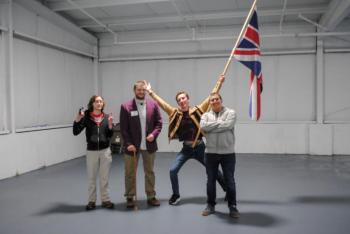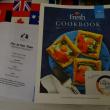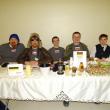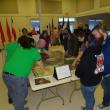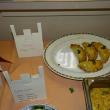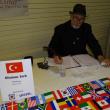BELFAST — Members and supporters of Belfast’s Game Loft gathered at United Farmer’s Market Saturday, April 27, to compete in the board game Pax Britannica.
Seven teams were assembled to represent the different countries involved in the complicated game, which has an unusual goal: Maintaining world peace.
The teams were composed of the Great Powers prior to World War I, and included Great Britain, France, the U.S., Germany, Austria-Hungary, Italy, Russia and Japan.
Although the board included with the game is on the larger side of standard board games, it has been blown up by the Game Loft to make it easier for the many participating in the game to keep tabs on the action.
While most of the official gameplay occurred on April 27, the event actually began the day prior, at Belfast’s Boathouse. The kickoff event, which began at 5:30 p.m., included an international buffet featuring dishes from the represented countries, all cooked by community members, who were invited to participate.
Those who went to observe the event, or were not involved in any of the teams, were invited to speak with representatives of each of the countries to hear why they deserved to win the five-point prize gained by the team that convinced the most people.
In the midst of all the mingling and strategizing, Ray Estabrook took the microphone to express his appreciation to the crowd and remind everyone to use their vote token.
“If you don’t already have a vote token and you are not playing on one of the teams, please go to the front reception desk to grab one because you’ve got the next hour or so to visit with the teams and try to determine which nation you think is best able to preserve peace in the area of 1880-1914, and then when you decide you can just drop your vote token in the little bucket, and teams will be eager for your vote,” he said.
Pleas from world powers
Each team has different strengths and weaknesses in the game and each must take different paths to potential victory. Although the game calls for four to seven players, the Game Loft’s event included over four times that many people during this year’s event.
With 35 people spread among the seven teams, there was no shortage of unique speeches being pitched to those in possession of the sought-after token. While many of the 35 players were school-aged, the ages of those involved ranged from 12-71, according to Game Loft Co-founder Patricia Estabrook.
Team Italy
Searsport District High School senior Bradley Arsenault, who played Pax for his second time this year, was on team Italy this time around. During his pitch Arsenault laid out plans to reach victory via tangible means:
“Italy plans to take the victory by providing people with pasta, ensuring that they never run low on meatballs, and making sure everyone gets a slice of pizza,” Arsenault said, noting that the tactic has proved successful in the past.
Team Japan
One of the older players in the game was one-time Game Loft President (and current volunteer,) Jim Dean, who was on team Japan.
Dean said some of the specific circumstances of the countries in play are blurred to make the playing field more balanced. He said the first focus for team Japan was its economy.
“We’re trying to build up our economic values and build up their economy, to the point that we can start generating fleets,” he said before explaining how this mission could be accomplished.
“There [are] four ways; you have interest, imports, protectorates, and possession markers. Japan has no way of doing possessions, but interest is showing that we have an economic interest in the area. You get a small amount of money back from that area each turn. Influence is a bigger amount, and a protectorate usually means you’re taking control of the area. You’re able to take more money and that type of stuff from the people that live there. What you’re trying to do is force those values up so that over time…. You can either, like Great Britain, do more things across the world, or like us, try to build up in one area. We’re kind of cornered around China and that’s where we stayed,” Dean said of team Japan.
If it seems like Dean is particularly well versed in the game, it’s likely because he’s been playing it for roughly 30 years.
“I originally bought the game myself and was one of the original people who played it at the Loft,” he said, adding the founding members played it a lot back then and have recently picked it up and started playing it again.”
The event, which also took place last year for the Game Loft’s 20 year anniversary, is not annual, however, its popularity last year led Co-founders Ray and Patricia Estabrook to bring it back again for the second year in a row.
Team Austria-Hungary
Another Pax player, Henry Saggese, was on last year’s winning team, Italy, and expressed his gratitude for not being on the same team this year since “everyone is going to target” them due to their blowout victory last year.
This time around he was on team Austria-Hungary and had little faith they would be able to win the game, though he shared thoughts on the other countries in the competition.
“Britain wants to start a war, they get victory points if someone starts a war early in the game. They’re warmongers. They’re not fun and they’re right over there and I’m afraid one of them is going to hear me,” he said, glancing across the room to check for any sign he’d been heard.
“They will annihilate us. We can’t defend against them much. Scary. Germany, they start world wars later; Russia is basically an active antagonist because their conditions for getting victory points directly conflict with us and none of it’s fun. There is basically no way we can win. I’m sure we can pull it off somehow if we can win the people’s vote.”
Fellow Austria-Hungary teammate and high schooler Jeremiah King offered his own take on why the team deserved the sought-after early advantage.
“As Austria-Hungary, we are a dual monarchy, we are a nation built of smaller nations, so if any nation is going to have dominance over the entire globe, it might as well be one that has experience of being a collective; and support for the entire collective. We might be the underdogs, Britain might be vying for war, Germany might be hating France, and Italy might be sitting there acquiring riches, but we’re the underdogs, and with the support of the people, the support of multiple different structures, bending together like a house of cards into one, for one purpose, we might just come out on top,” he said.
Team Russia
Not content to simply watch the game unfold, Patricia Estabrook participated in the event as a member of team Russia. A longtime player of Pax Britannica, she said this year she came with an all-new strategy in the team’s bid to win.
“We’re an all women’s team and we are the team of peace. We are allowing self-determination for various countries so that we do not want to treat them with imperialism, we want them to be able to make their own decisions and not have foreign powers come in and ruin their cultures. So we are allowing the rebellion in China to blow over, let the Chinese make their own decisions without our interference. We are supporting the Turk in allowing him to maintain his own provinces and we’re hoping to have peace and solidarity with our neighbors the Chinese, the Americans, and the Japanese…. It’s a revolutionary kind of way of thinking, not grabbing things sort of selfishly, but working cooperatively,” she said.
“I don’t know if it will be a winning strategy, but I’ve been playing this game for 30 years and every year I play it a little bit differently and sometimes you’ve got a great strategy, and sometimes it is an interesting idea but it doesn’t work,” Estabrook added.
While winning the game by maintaining peace is the ultimate goal of the game, another goal is simply not to be the country who is responsible for WWI breaking out.
“The ultimate purpose is to try to prevent WWI because if you are the country that causes WWI you will probably lose the game. There’s a big penalty for doing that and being aligned with that country, so you can take other people down with you with your war-like games. So we’re not trying to do that, we’re trying to be peaceful,” she said.
Estabrook, who made blini for the event, said one of the great aspects of the game is that it’s peace-centric, in addition to teaching its players a variety of things.
“All of the issues that we deal with in this game are issues that are happening today. So kids really understand a lot about geography, a lot about how to preserve world peace, and about how the sort of boundaries get broken by people,” she added.
Team France
Across the room, Waldo County high schooler Kevin Bergelin decided to speak on behalf of his team, team France.
“So the reason that France should get this bonus is basically if the game ends early enough, Britain will win. Britain has the best chance of winning out of every other team because they’ll just continuously get more points. France is in second place and we have our best chance of beating them, so if we want the tyranny of Britain and just their complete global domination to end, France should get this bonus so we can actually be able to be the complete powerhouse that is my team,” Bergelin said.
Bergelin said there are a number of reasons why Great Britain can be so difficult to beat.
“It’s their control of the world, they control most of the stuff on the map and they get a lot of points from it. That’s why. They also have quite a bit of money so that always helps.”’
Team Great Britain
When asked about other teams poor-view of Great Britain, Stephen Colby, who runs the Game Loft’s I Know ME program, had his own theories about their reasoning.
“You heard that from biased and from if I might say, jealous, competitors. Other countries do admire our position in the world but I do not think we have a chance to win more than any other country,” he said with a smile.
Colby also gave an impassioned speech about why Great Britain deserved to win the early advantage.
“The year is 1880 and as you can see there’s many chaotic things happening in the world. Some of the minor powers are starting to develop protectorates in Africa. Germany is rising to power, they’re a newer country, they’re looking to spread colonies. Italy is currently without colonies and they would also like to spread colonies. China has gone into unrest, so there’s lots of chaos, and as chaos comes many minor powers will start to move in to quell the chaos in a sense. They might start fighting or bickering, putting interest or protectorates in similar areas, and as the great protector of the world, Great Britain would like to help to keep the peace. When Italy inevitably steps on Germany’s toes, we would like to step in and make sure there isn’t a problem and that war doesn’t break out. When China is in unrest and Russia moves in to enforce peace, we would like to help liberate the Chinese and keep them a free country like they would like to be,” he said, to the quiet chuckles of his teammates.
Team U.S.A.
Belfast High School student Damian Whitmore spoke for team America, saying that prior to World War I the U.S. could use an advantage.
“America isn’t really a major power yet at this time in history, so we’re not really in a position yet from where we are to help other countries that are in need, where we’d make an alliance. So that’s kind of a big problem for us, we’re sort of stuck in our own hemisphere at the moment, so that’s kind of our goal. We need to get more troops, more fleets, to expand to help the countries to make an alliance with. But unfortunately nothing in this world is for free, so the more money we have the better it benefits us, so we can help the other countries if we need to,” Whitmore said.
Some of his team’s goals include making Alaska and Hawaii states, in addition to Puerto Rico and Cuba. Another goal involves the creation of a well-known trade route.
“One of the goals we have to help us expand is to build the Panama Canal, but our chances decrease as the years go by, as each turn passes,” he said, explaining that each turn in the game represents the passage of four years.
“So that’s why at the start of every turn, the United States rolled to see who was president, republicans or democrats. I believe there is something different between the two parties you have to do, but I’m not sure,” he said.
When asked if he thought their team could win, Whitmore said that although they won the practice game, the addition of long-time players was of concern given their “proficiency” in the game.
Last year marked Whitmore’s first time participating in the game, which he characterized as “cool.”
“It’s a really cool game, simulates history and makes you really think about strategy and politics and all that,” Whitmore said.
Team Germany
Brian Phelps, the game’s Kaiser of Germany, kept his speech short and to the point.
“The world’s conflicts come from nations setting up protectorates when really they’re only trying to protect their wallets, not the people that live in those places. Germany intends to make sure that we will live and strive through economic and not military force,” he said.
Team Ottoman Turk and the Lone Turk
While the major powers are tasked with most of the action in the game, one man returns as the lone player on team Ottoman Turk every time the game is played. That man is Michael Lawson, a retired teacher and dedicated Game Loft supporter.
“The Ottoman Empire is currently in unrest. The Anatolia has gone into unrest. That is my capital, so I am trying to quell that unrest. I can hopefully do that myself before some major power comes in and helps me quell the unrest so that my children will then be speaking German or French. I would hope that they would still get to be Turkish,” he said. Unfortunately, that historical path is left entirely up to luck.
“That does depend on a dice roll… as valiant as the fighting Turks are, we roll manure-like dice, but there is hope. Last year at this time I was out the first turn. I roll lousy dice, but that’s okay, there is hope, this is another year. ” he said smiling.
Lawson said that Ottoman Turk is not the most popular country to represent, hence his reprisal of the role over the years.
“We’re not movers and shakers in the world so there is very little to do, so I sit here and have a wonderful time, and can teach you Turkish if you like,” he said, adding that he’s played the game roughly 20 times.
“I like the people. Ray and I are old friends,” Lawson said.
Remarks from Ray
When Ray Estabrook took to the microphone for the second time during the event, he thanked the Game Loft board of directors, staff, volunteers, and especially the Game Loft youth.
“I’m hoping you’re appreciating that our kids are taking on the complexities of the origin of World War I, a subject that has baffled historians for over 100 years. I just want to take a moment because people have asked me why we’re doing this, and it’s simple. First it’s fun, that’s important, but on another level we think that it’s important for what it can tell us about today, and it’s a great way for all of to think about today’s politics without having to say what side we’re on,” he said before going on to speak about Rudyard Kipling and the impacts of war.
“Rudyard Kipling was the poet and the spokesman for the age of the British Empire and he thought long and hard about the problem of empire. He saw that both motives of idealism and commercial gain sustained the Empire and he saw that those commonized by the Empire received both benefits and losses, and he feared that they might reap the whirlwind, and they did when the great war broke out and ended the great long peace.
“Rudyard Kipling lost his only son in that war, his name was John Kipling and he was aged 18, and he died in the mud of the trench warfare in 1915 and Kipling was devastated since he had used his connections to get John into the Irish Guards. And he was disgusted with the way the war was being prosecuted, he wrote: ‘if any question why we die, tell them because our fathers lied.’ So, today, with 800 military bases spanning the globe, we, too, have an empire, we too are risking the lives of our sons and daughters on far-flung dunes and headlands to quote Kipling. Like Kipling, we too wonder if our leaders and our generals know what they’re doing. We too think about the benefits of empire,” Estabrook said.
In the end, Great Britain was declared victor of this year’s Pax Britannica game.
Erica Thoms can be reached at news@penbaypilot.com



